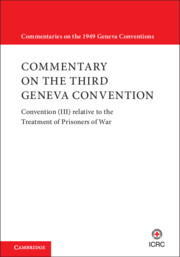 Commentary on the Third Geneva Convention
Commentary on the Third Geneva Convention Book contents
- Commentary on the Third Geneva Convention
- International Committee of the Red Cross
- Copyright page
- Contents
- Foreword by Peter Maurer
- Acknowledgements
- Abbreviations
- Introduction
- Preamble
- Part I General Provisions
- Part II General Protection of Prisoners of War
- Part III Captivity
- Part IV Termination of Captivity
- Section I Direct repatriation and accommodation in neutral countries
- Article 109 Direct Repatriation and Accommodation in Neutral Countries: General Observations
- Article 110 Cases of Repatriation and Accommodation
- Article 111 Internment in a Neutral Country
- Article 112 Mixed Medical Commissions
- Article 113 Prisoners Entitled to Examination by Mixed Medical Commissions
- Article 114 Prisoners Meeting with Accidents
- Article 115 Prisoners Serving a Sentence
- Article 116 Costs of Repatriation
- Article 117 Activity after Repatriation
- Section II Release and repatriation of prisoners of war at the close of active hostilities
- Section III Death of prisoners of war
- Part V Information Bureaux and Relief Societies for Prisoners of War
- Part VI Execution of the Convention
- Book part
- Sources
- Index
- References
Article 110 - Cases of Repatriation and Accommodation
from Section I - Direct repatriation and accommodation in neutral countries
Published online by Cambridge University Press: 21 August 2021
- Commentary on the Third Geneva Convention
- International Committee of the Red Cross
- Copyright page
- Contents
- Foreword by Peter Maurer
- Acknowledgements
- Abbreviations
- Introduction
- Preamble
- Part I General Provisions
- Part II General Protection of Prisoners of War
- Part III Captivity
- Part IV Termination of Captivity
- Section I Direct repatriation and accommodation in neutral countries
- Article 109 Direct Repatriation and Accommodation in Neutral Countries: General Observations
- Article 110 Cases of Repatriation and Accommodation
- Article 111 Internment in a Neutral Country
- Article 112 Mixed Medical Commissions
- Article 113 Prisoners Entitled to Examination by Mixed Medical Commissions
- Article 114 Prisoners Meeting with Accidents
- Article 115 Prisoners Serving a Sentence
- Article 116 Costs of Repatriation
- Article 117 Activity after Repatriation
- Section II Release and repatriation of prisoners of war at the close of active hostilities
- Section III Death of prisoners of war
- Part V Information Bureaux and Relief Societies for Prisoners of War
- Part VI Execution of the Convention
- Book part
- Sources
- Index
- References
Summary
The preceding article sets out the obligations of Parties to the conflictwith regard to direct repatriation or accommodation in neutral countries ofprisoners of war during hostilities. Article 110 supplements that article bydefining seriously wounded and seriously sick prisoners of war eligible fordirect repatriation, and less seriously wounded and sick prisoners of warwho may be accommodated in neutral countries.
- Type
- Chapter
- Information
- Commentary on the Third Geneva ConventionConvention (III) relative to the Treatment of Prisoners of War, pp. 1570 - 1578Publisher: Cambridge University PressPrint publication year: 2021


